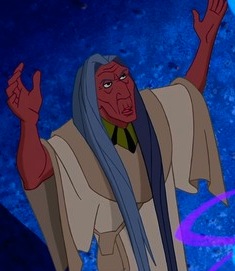Friday, June 23, 1995.
POCAHONTAS. Written by Carl Binder, Susannah Grant and Philip LaZebnik. Loosely based on the historical figures Pocahontas/Rebecca Rolfe (1596-1617) and John Smith (1580-1631). Music by Alan Menken. Lyrics by Stephen Schwartz. Directed by Mike Gabriel and Eric Goldberg. Running time: 81 minutes. General entertainment.
NEVER MIND DWARVES. This one's for the gnomes.
Touted as the summer's Number One blockbuster release, Pocahontas The Cartoon is guaranteed a standing ovation on Wall Street. "History in the making," gushes Premiere magazine, as it predicts earnings of $240 million.
Never mind entertainment. Disney, with the help of computer technology and a sophisticated marketing division, is finally over its outdated dependence on such concepts as wit, imagination and artistic daring.
With fine corporate confidence, the General Motors of animation strides towards the 21st century with a product that combines the creativity of Hanna-Barbera with the look of contemporary Japanimation. An empty package, Pocahontas The Cartoon is on the cutting edge of robo-consumerism.
Never mind history. Everybody knows that the story of the pre-teen Algonquin princess, who convinced her father to spare the life of an obnoxious 28-year-old English colonist, is a specious tale at best.
Since the studio bosses were already keen on a cartoon Romeo and Juliet, turning Pocahontas into a dark-skinned teen dream (with almond eyes and curves that just won't quit) made good business sense. Soldier of fortune John Smith cleans up nicely as her golden-haired heartthrob, the bad boy from the wrong side of the ocean.
In co-operation with their two directors, the three screenwriters came up with the story of an English expedition to Virginia's Chesapeake Bay in the year 1607. Racist and rapacious, its leader John Ratcliffe (voice of David Ogden Stiers) is greedy for gold.
Upon meeting Pocahontas (Irene Bedard; singing voice, Judy Kuhn), Smith (Mel Gibson) converts to mystic, Earth-friendly multiculturalism. Like Clint Eastwood in Paint Your Wagon, he talks to the trees. One of them (Linda Hunt) talks back.
As in Romeo and Juliet, a member of his tribe (Christian Bale) kills a member of her tribe (James Apaumut Fall), and Smith is held responsible. Pocahontas intervenes at his execution. Her dad, Chief Powhatan (Russell Means), setting aside the misgivings of his medicine man Kekata (Gordon Tootoosis), relents.
Dad applauds her "courage and understanding" and vows to embrace peaceful co-existence. Truth to tell, Pocahontas's gesture looked more like a case of raging hormones: dare we say teen lust?
No.
We don't dare because this charmless, politically correct tract is just so gosh-darn full of positive messages about tolerance, diversity and Care Bear goodness that to attack its superficiality might appear to be an attack on the values behind which it hides.
Still, when Pocahontas makes it clear that she regards marriage as a consummation devoutly to be shunned (because it means "an end of dreaming"), I had to wonder why two people joined in love cannot dream together?
Does the Disney conglomerate not value marriage?
Not as much as it values multi-media cross-over profitability. Pocahontas producer James Pentecost is, of all things, a veteran New York theatre producer with no previous motion picture experience.
The recent success of its Beauty and the Beast stage production has made Disney keenly aware of the potential for "Broadway-oriented animated musicals." With a melodramatic climax right out of a Wagnerian opera, Pocahontas The Cartoon clearly is headed for the Great White Way.
Never mind that great boring lump of bland music and bad art that's currently on view in theatres near you.
The above is a restored version of a Province review by Michael Walsh originally published in 1995. For additional information on this archived material, please visit my FAQ.
Afterword: Pocahontas was indeed Broadway-bound in mid-1995. By 1996, though, the Disney corporation's Theatrical Productions unit had shelved the project after the cartoon feature's disappointing performance at the box office (a mere $141.5-million domestic gross, far short of Premiere's $240-million prediction.
The Disney organization went to some trouble to cast performers of First Nations — or, as they say in the U.S., Native American — ancestry. Irene Bedard, the voice of Pocahontas, is an Alaskan whose mom was Inuit; dad was Metis. Russell Means (Chief Powhatan), a founding member of the American Indian Movement (AIM), was of Oglala/Sioux heritage, while Gordon Tootoosis (the shaman Kekata) was a Canadian of Cree and Stoney descent. When I noticed that Tootoosis had twice as many acting credits as the other two combined, I realized that I am familiar with more First Nations (Canadian) actors than Native American ones. This raised an interesting question: Do aboriginal Canadians outnumber aboriginal Americans in the performing arts? A simple Internet search took me to a Wikipedia entry listing Native American Actors. There is also a list for First Nations Actors. Simple logic suggests that the U.S. list should be 10 times longer than the Canadian one, reflecting the real-world difference in the two country's populations. The actual numbers — 25 Native American names versus 52 First Nations — show that Canadian performers outnumber the Americans two to one. Why that should be is a subject for some serious further study. I found it interesting that the Saskatchewan-born Tootoosis was in both the Disney cartoon Pocahontas, and a live-action Canadian feature, Pocahontas: The Legend (1995), where he co-starred as Chief Powhatan, the title character's father. Forty years ago, Tootoosis made his feature film debut playing the legendary Almighty Voice, co-starring opposite Donald Surtherland in 1974's Alien Thunder. Among his many subsequent roles was Old Aenons, in director Bruce Bereford's moody Black Robe (1991). He combined a successful career in television and the movies with a lifetime of First Nations activism and community service. Tootoosis died in 2012 at the age of 69.
